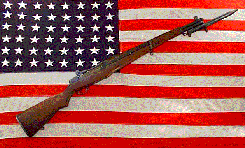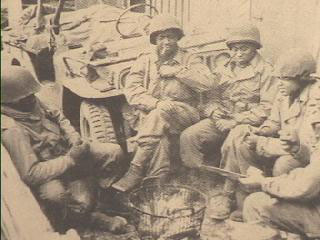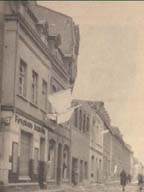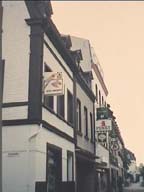[Home]| [Childhood]|[Battle of the Bulge]|[Northeast to Koln]|[Remagen Bridgehead Battle]|[Bridgehead Expansion]|[Ruhr Battle]|

The Bridgehead Expansion
|
|
|
Black Soldiers of 393rd E Co |
By March 11, 1945,
the 99th Infantry Division earned the distinction of being the first Infantry
Division "in force" to cross the Rhine.
After crossing the
Remagen railroad bridge, Company K moved to high ground. Four German soldiers were
captured here and Arlinghaus was ordered to take them to the appropriate
authorities. On his way back up the hill, he noticed a large barn six to eight
feet off the road with a sign stating "Collection Point." Hoping for
supplies, he entered the barn and saw dead bodies stacked like cord wood.
"Nothing here I can use" he thought, and abruptly returned to his
Company.
The men were
"digging in" and Arlinghaus had only a trench about eight inches deep
dug when machine gun fire whizzed four feet above his head. Two men were
wounded and moaning as Arlinghaus flung himself into his shallow trench. He
stared up at the dark night and guessed that approximately one hundred rounds
were fired and then fell asleep. The next day, he claimed the five and one half
foot deep foxhole of the wounded soldiers who had been evacuated. He filled a
canteen from a scum-covered pond, plunked in two water purifying pills, and
enjoyed instant Nescafe coffee heated with the candles he carried in his
pocket. He hadn't eaten in days.
Their ranks had been
thinned in the town of Remagen, and without a partner, he'd stand watch alone
the entire night. Arlinghaus dreaded the thought of trying to stay awake with
only his cramping gut to keep him company. As he crouched in his foxhole and peered
off into the darkness, a replacement soldier walked toward him. Arlinghaus
asked if he had anything to eat; his new buddy produced a K ration. Arlinghaus
was thrilled and asked the soldier if he would split the dinner, but instead,
the man gave him the entire ration, saying he wasn't hungry. They enjoyed one
another's company, talking about their families back home and their war
experiences. The soldier said he drove a truck behind the front lines but
wanted to be a fighting man. During one of their conversations, the soldier
said that he had two years of college but gave up his stripes and volunteered
to join the infantry. The soldier gave Arlinghaus a blanket and insisted on
taking the first watch. Arlinghaus felt grateful as the blackness of the night
blended into a dreamless sleep. When he awoke, he realized that his buddy had
let him sleep for hours. When asked why, the soldier said "I'm not
tired." Arlinghaus was impressed by this man's gentleness and
professionalism. As daylight approached, he realized that the soldier was a
black man.
Suddenly the Company K
Lieutenant yelled, "I need five men to scout! Arlinghaus!" For some
reason he was always chosen as scout. Reflecting on this later in life, he
decided that because he grew up in Kentucky, people automatically thought he
shared Daniel Boone's talent for scouting. However, disgusted that this job
consistently fell to him, he said to the Lieutenant "why are you always
calling my name?" At that moment, the black soldier said, "I'll
go." Four other black soldiers agreed to go with him. As soon as they went
over the hill, the sharp cracks of artillery fire rang out. Only two returned,
carrying one of the wounded. Arlinghaus's friend was not one of them. For the
first time during the war, he cried.
Historical note:
"The official history of the 394th speaks of the colored troops in these
words...the colored platoon of K Company, which had already distinguished
itself in its few days of battle, accounted for the major portion of the 300
POWs taken." 1 (Black soldiers rarely fought on the front lines
and Honningen was their first real battle. These 300 German prisoners were
captured there).
1 McMurdie, William. Hey, Mac! Gig Harbor, Washington: Red Apple Publishing. No date. p134.
Another Replacement Soldier
By crossing the
Remagen Bridge, the Americans had penetrated deep into the German homeland and
were warmly greeted by a fist in the face. The Germans made certain that their
fields would be fertilized with American blood. From his hilltop position, Arlinghaus
had a beautiful view of the Remagen Bridge and the newly built pontoon bridge
that was funneling additional troops and equipment to the east bank of the
Rhine. The army lost no time in providing him with a new foxhole buddy--a
replacement soldier that shook so badly he was useless. Arlinghaus tried to
calm him as a wave of artillery spit steel during his "baptism of
fire." Above the ear splitting din, the words "heads up" were
shouted again and again by the lieutenant, ordering the men to shoot back.
Arlinghaus's buddy lay crouched in a fetal position at the bottom of the hole.
Suddenly, a shell hit so close it threw clumps of mud into the coffee
Arlinghaus had warming on the earthen shelf he carved into the wall.
"Damn, they ruined my coffee, now they're going to make me mad" he
said jokingly. The young soldier looked at him in amazement and said, "You
don't really give a damn, do you?" Arlinghaus said "The sun is
shining--it's a pretty day to die. Everybody has to die sometime." For
some reason, this calmed the quaking recruit. The replacement soldier one day
became a seasoned sergeant and "A damned good one at that,"
Arlinghaus thought.
According to the route a
Company K soldier gave to Captain Simmons, Company K stayed on the hill at
Ariendorf until March 15th. Company K then took the following path:
- March 16th-Attacked and took Honningen
- March 20th-Took Hammerstein
- March 21st-Took Dattenberg (very little
resistance)
- March 23rd-Moved to Guckheim
- March 28th-Moved to Launsbach by truck
- March 29th-Moved to Heuchelheim
The Unseen Enemy
During WWII, men were
largely fighting an unseen enemy. In the not too distant past, soldiers were
advised to shoot "when you see the whites of their eyes." Now due to
long-ranged weapons, artillery fire was returned in the same direction it was
received. Rarely was it necessary to look the enemy in the eye.
Arlinghaus and his
foxhole buddy watched from the hilltop on the east bank of the Rhine as two
German officers (who looked six inches tall from the distance) headed back to
the woods after going into town. Thanks to a light dusting of snow, Americans
had noticed the Germans' footprints leading out of the woods earlier in the
day. As the officers approached the tree line, huge fireballs of artillery
whizzed in an arc over the hill and leveled the secluded German platoon. Two
horses attached to wagons dashed out, adding fury to the deafening sound. An
entire platoon of German soldiers was destroyed, sight unseen, because two
German officers became careless.
Snipers were always a
hidden threat. While on this same hilltop, a German sniper hit the Company K
machine gunner in the shoulder. A medic ran to his aid and was also shot;
another medic attempted to assist both of them and yelled for cover. Arlinghaus
estimated that he, alone, discharged at least four clips of ammunition into the
woods. All of the soldiers pounded the area with machine guns, automatic rifles
and army issue bullets that could penetrate thirty-six inches of wood and
one-half inch of steel. One American soldier was hit in the elbow, causing his
forearm to spin around like a pinwheel. The following day, they found twenty
dead Germans who had been moving an anti-aircraft gun into place. The gun had
been destroyed along with the gunners. The German soldiers' mission would have
been successful if it hadn't been for the sniper. (During a 99th Division
reunion in the 1990's, Arlinghaus noticed a man with a badly scarred elbow who
said he had been wounded at Remagen. The man did not want to talk about his
wound but did say that he fought with the 393rd Regiment. Sometimes various
regiments crossed paths during the confusion of war. Arlinghaus wondered if
this was the same man he saw injured on the hilltop).
The Whites of their Eyes
The enemy was not
always sight unseen. At one point during the war, a fire fight had broken out
on the opposite side of a hill. While a few Company K men were searching nearby
farm houses for food, a Lieutenant yelled "we've got trouble on the hill,
those soldiers need backup." Arlinghaus and the other squad members forgot
about their aching stomachs and began running up the nearby hillside. While
crouching behind the hill for protection, their own BAR man held his gun over
the top of the hill, letting it chug on and on. Arlinghaus and his buddies felt
fear wrap itself around their legs, pulling them against the hill's face.
Arlinghaus gingerly stood to get a better view and a bullet whistled passed his
ear. He turned and saw a German soldier about twenty feet away--close enough to
throw a hand gernade at them. Arlinghaus quickly shot him and realized the
soldier wasn't alone. Another bullet came from the left. He saw the other
soldier fall behind a tree a split second after he fired. Arlinghaus never
found his body and was spared adding another macabre dimension to the nightmare
he had just lived through.
The Town of Honningen
|
|
|
Honningen in 1945 |
On March 16th the
394th Infantry marched south to the town of Honningen. A bitter, bloody fight awaited
them. They slugged away relentlessly at the Nazi defenses in a hair-raising
house to house fight. (This is the town where the Company K black soldiers were
praised for their capture of 300 German soldiers). Arlinghaus and a few squad
members entered a house and captured a German "flak-wac." She was
told to put her hands on her head, but haltingly reached behind her back. She
was shot instantly. Arlinghaus was shocked and asked the private "Why the
hell did you shoot her--she had no weapon?" The soldier said that he
thought she was reaching for a gun, but maybe she was just going to scratch
herself. The private's quick reaction might have saved their lives; but
instead, he felt robbed of his own. Every building had to be cleared. The white
flags displayed by the town meant nothing. Fighting continued all during the
day and night and into the next afternoon. On the second day, the town fell.
The battered troops rested on the hillsides overlooking the town of Rheinbrohl
on the banks of the Rhine River.
Crossing the Autobahn
|
|
|
Honningen Today |
After leaving the
town of Honningen, Arlinghaus was once again first scout for his squad. They
were headed southeast, out of the established Remagen bridgehead, and in the direction
of Frankfurt. While scouting, Arlinghaus crossed the autobahn, Germany's famed
super highway. (It is also called the Frankfurt-Cologne Highway). As he made
his way up the embankment and onto the road, he noticed a blown out overpass a
few hundred feet to the right. There was nothing but open meadow on the
opposite side of the road.
Later when back with his
Company, Arlinghaus sat down to a much anticipated meal of K rations. He
glanced up and noticed his Lieutenant speaking to a Major. It was unusual to
see a Major on the front lines. Arlinghaus became uneasy when he noticed the
Lieutenant pointing him out to the Major. Arlinghaus thought, "damn, what
did I do wrong?" At that moment, the Major approached Arlinghaus and
introduced himself. His name was Major Ken Hechler, a military historian. Major
Hechler took his name and said that Arlinghaus would go down in history as the
first man "in force" to cross the autobahn. Arlinghaus thought that
history was Caesar, King Arthur, and Napoleon. It was a good feeling to think
that in some small way he was a part of history. (Major Hechler wrote a book
called The Bridge at Remagen published in 1957. Later he became the US
Congressman from West Virginia and in 1985, the West Virginia Secretary of State.
Arlinghaus met him in the 1990's at a 99th Division reunion. They talked about
that first meeting and Major Hechler said that he still had Arlinghaus listed
as the first man "in force" to cross the autobahn.


